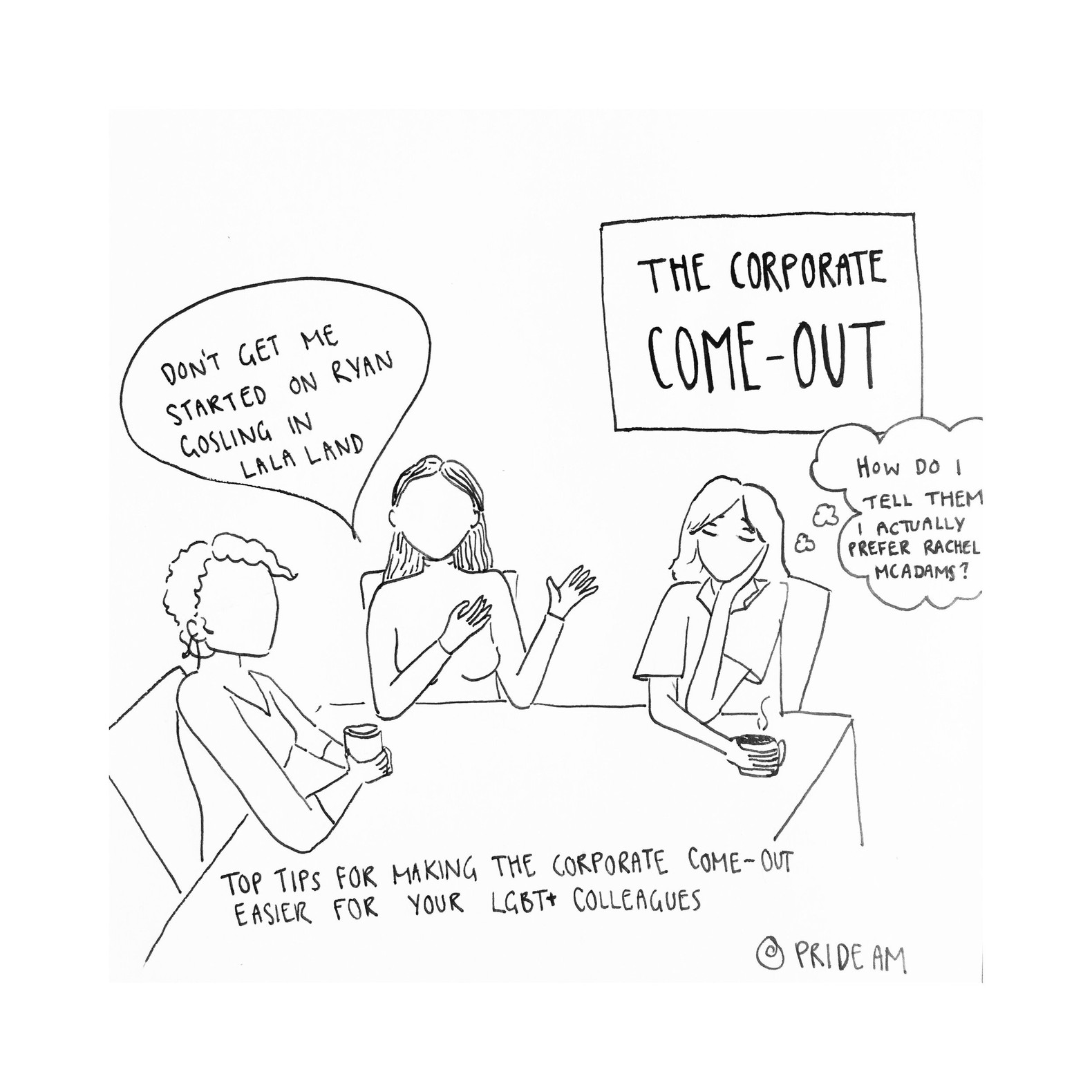The Corporate Come-Out: Top Tips for Creating a Welcoming Work Environment for Your LGBTQ+ Colleagues*
*Tips on being a decent human

Starting a new job is nerve-racking enough, but for people in the LGBT+ community it’s that much more terrifying, because once again we have to deal with The Corporate Come-Out. Particularly in any industry where we’re seriously underrepresented.
Am I right in the role? Will I exceed expectations? Will I make friends?
These are natural concerns that most of us have running through our minds as we make our way to our first day at a new job.
Will they assume I’m straight? Should I just succumb to the pressure to perpetuate certain aesthetic stereotypes, pandering to straight expectations of LGBT+ behaviour so that I won’t have to explain myself? Will I have to ‘perform gayness’ just so I can avoid yet another lunchtime conversation in which I’m asked who I think the office hunk is? (Who even uses the word hunk these days?)
Do I try to subtly work my sexual orientation into the conversation or will there be an awkward moment when I have to correct my new boss, telling them that actually, no, my partner is in fact a woman?
Unless you fit a rather aesthetically structured stereotype an assumption we can make in this day and age is that the corporate come-out is well and truly still alive.
So there I was – first day nerves. I’d been out at my last workplace. I had the experience under my belt, so it should have been easier this time around, right? That’s what I thought, what I hoped for. But alas, something that hadn’t even crossed my mind was that I’d had a girlfriend last time round. Although I may have had to correct my colleagues on the pronouns and gender my partner identified with, it provided a suitable opportunity to establish that, indeed, I am not heterosexual.
Having just started a new job and recently single, there was no partner to talk about and therefore no obvious moment to pre-emptively correct people’s assumptions that my prospective partner would be male (no partner, no opening conversation you see). And with my hair the longest it’s ever been, a newfound love for perfume and a lack of girlfriend-gushing, most people were assuming I was straight. How would I get to the point where I could tell them that I just didn’t feel the same way about Ryan Gosling as they do? I didn’t know my colleagues well enough yet to casually drop into conversation that I actually prefer Rachel McAdams.
Of course each person’s journey and approach to the Corporate Come-out will be different. I have friends who are very open about this part of their identity at work and will happily talk about their latest HER match over their morning coffee. I also have friends who think it’s irrelevant to their day-in day-out work routine and are therefore more than happy for it never to be brought up in conversation. Whatever floats your boat, my friend.
However, a person should always feel comfortable enough in their work place to bring their authentic self to the job.
If you’re still reading this, then I know you want to be one of those people who helps foster the kind of environment that’s inclusive and welcoming to LGBT+ people, so here are my top tips on how to make the Corporate Come-out easier for others:
1. When someone refers to their “partner”, do not – I repeat – do not assume that partner’s pronouns and gender. Just refer to the colleague’s partner as “they” unless the person you’re talking to drops a different kind of pronoun in there. As a straight person, you’ll be subtly demonstrating that you are aware of a non-heteronormative world and that you’re not making any judgements.
2. Don’t keep fishing. They may not drop a binary pronoun into the conversation and you’re just going to have to respect this. This is a big one – with more and more people not identifying with a binary gender, “they/their” is becoming a more common pronoun used by the LGBT+ community.
3. Don’t resort back to the ‘norm’ and assume someone is straight. Even if someone doesn’t have a partner, this doesn’t mean you have to avoid bringing up things like dating or celebrity crushes. Just go with gender-neutral pronouns. “What kind of person are you interested in?” or “Who would be your celebrity crush?” – it’s easy, see? And it provides a window for your colleague to tacitly mention their sexual orientation without making a big deal of it. Above all, be respectful.
4. If your workplace does not already have an LGBT+ network, set one up. Whether you identify as LGBT+ or as an ally, you can talk to your HR department about creating a network – or proactively do it yourself. Pride AM can provide lots of useful advice on how to do that. Just go to www.prideam.org/resources/ for more information.
Statistically, 41% of LGBT+ people don’t feel comfortable enough to come out at work and 62% of university graduates go back into the closet when they enter the workplace. Having a network and support system in place is healthy step towards encouraging change.
Some people think that you only come out once, but of course this isn’t the case. Colleagues who foster a welcoming environment for their LGBT+ co-workers can make a world of difference. And that means you.
Let’s make sure those shocking statistics are reduced and more people feel comfortable to bring their authentic selves to work.
The start of this movement could be as simple as this: don’t make assumptions.